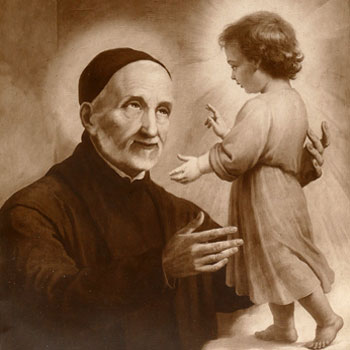
Apostle Paul Preaching on the Ruins
Giovanni Paolo Pannini
1744
Oil on canvas, 64 x 84 cm
The Hermitage, St. Petersburg


Saint
Bernardino Realino (1530-1616) spent most of his Jesuit life as a humble parish priest after renouncing a successful career as a lawyer. Born near Modena, Italy, on Dec. 1, 1530, he began university studies in philosophy and medicine but switched course midway through because he thought a legal career would bring greater advancement and wealth. Family connections helped him become mayor of Felizzano at age 26. The position included responsibility as a judge. People found him honest and asked that he be reappointed at the end of his first term. Other administrative positions followed until the marquis of Pescara took him into his employ, making him mayor of Castelleone.
Despite his success, Realino found that worldly honors less interesting than he had expected and began giving his money to the poor. In 1564 the marquis named him superintendent of his estates in the Kingdom of Naples. In August of that year he encountered two Jesuit novices and learned that the Society of Jesus had only recently arrived in Naples. A sermon by a Jesuit preacher moved him deeply and led him to ask the Jesuit to hear his confession. The priest recognized Realino's religious inclinations and asked him to make an eight-day retreat. Realino experienced great peace and had a vision of our Lady commanding him to enter the Jesuits. The lawyer promptly presented himself to the provincial who accepted his entrance into the novitiate on Oct. 13, 1564.
Realino initially asked to be a brother but superiors told him he should be ordained. Only seven months after taking first vows he was ordained on May 24, 1567. Soon afterwards Father General Francis Borgia appointed him master of novices in Naples, even though he was still studying theology. His prudence and sound judgment made up for lack of formal training. He also began the pastoral work that would occupy the rest of his years. He preached and taught catechism, visited slaves on the galleys in the Naples harbor, and heard confessions.
In 1574 he was sent to Lecce in Apulia, to investigate the possibility of establishing a Jesuit house and college. People responded enthusiastically, and Realino began pastoral work in Lecce that would continue for 42 years: preaching, hearing confessions, counseling clergy, visiting the sick and those in prison and giving conferences in convents and monasteries. Several times the Jesuit received orders to move to Naples or Rome, but every time he was about to leave the city, he was prevented by some mysterious happening, be it a sudden fever that required rest or intemperate weather. Eventually superiors decided to quit trying to move him.
Through the years Realino dedicated himself to pastoral care of people. In 1583 he began a sodality for diocesan priests to foster their own priestly virtues and to improve their moral theology so they could be better confessors. People of the town returned their affection, especially when the holy Jesuit fell into a final illness in June 1616. Magistrates came to him twice asking that he become Lecce's heavenly patron, but he could no longer speak and his sign was interpreted as agreement for the continued care of people of the city.
Originally Collected and edited by: Tom Rochford, SJ